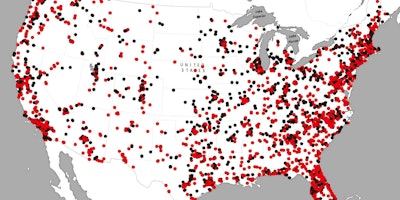About the Event
The members of the GSD African American Student Union have been working on a research initiative entitled “Map the Gap,” which investigates spatial, socioeconomic, and political inequities in ten U.S. cities. The initiative is rooted in U.S. current events. It analyzes recent police shootings by contextualizing fatal encounters within their built environment. We hope that the hackathon will drive constructive conversations around inequity, begin to reframe alternate modes of decisionmaking/ policymaking, and offer a new model for learning and teaching within academia.
The goal of our hackathon, which will be funded through a Spark grant from the Harvard Institute for Learning Technologies (HILT), is to bring together students, practitioners, academics, and community members to further conversations about inequity in our nation’s urban centers. We will gather data and information across our project’s four main categories (housing, education, transit/job access and crime), and discuss the results of the research together.
Schedule
12 - 1 p.m.: Registration
1 - 1:30 p.m.: Hackathon Introduction
1:30 - 4 p.m.: Hacking
4 - 5 p.m.: Discussion of findings
5 - 6 p.m.: Dinner and keynote speaker
About the Speaker
Nancy Krieger, PhD
Professor of Social Epidemiology | Department of Social Behavior, Harvard T.H. Chan School of Public Health
Nancy Krieger is Professor of Social Epidemiology, in the Department of Social and Behavioral Sciences at the Harvard T.H. Chan School of Public Health and Director of the HSPH Interdisciplinary Concentration on Women, Gender, and Health. She received her PhD in Epidemiology from the University of California at Berkeley in 1989. Dr. Krieger is an internationally recognized social epidemiologist, with a background in biochemistry, philosophy of science, and the history of public health, combined with over 30 years of activism linking issues involving social justice, science, and health. In 2004, she became an ISI highly cited scientist (reaffirmed: 2015 ISI update), a group comprising “less than one-half of one percent of all publishing researchers,” and in 2013 was the recipient of the Wade Hampton Frost Award from the Epidemiology Section of the American Public Health Association; in 2015, she was awarded the American Cancer Society Clinical Research Professorship. Informed by an analysis of the history and politics of epidemiology and public health, Dr. Krieger’s work addresses three topics: (1) conceptual frameworks to understand, analyze, and improve the people’s health, including the ecosocial theory of disease distribution she has been developing since 1994 and its focus on embodiment and equity; (2) etiologic research on societal determinants of population health and health inequities; and (3) methodologic research on improving monitoring of health inequities. Examples of her epidemiologic research include: studies on racism, discrimination and health; socioeconomic and racial/ethnic disparities in breast cancer; and research on appropriate measures of social class (individual, household, and neighborhood) for monitoring social inequalities in health and studying women, gender, class, and health. She is author of Epidemiology and The People’s Health: Theory and Context (Oxford University Press, 2011), editor of Embodying Inequality: Epidemiologic Perspectives (Baywood Press, 2004) and co-editor, with Glen Margo, of AIDS: The Politics of Survival (Baywood Publishers, 1994), and, with Elizabeth Fee, of Women’s Health, Politics, and Power: Essays on Sex/Gender, Medicine, and Public Health (Baywood Publishers, 1994). In 1994 she co-founded, and still chairs, the Spirit of 1848 Caucus of the American Public Health Association, which is concerned with the links between social justice and public health.
Location
Dates
to 2nd April 2016 - 06:00 PM
